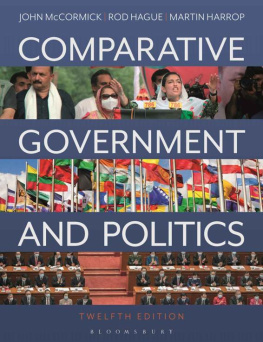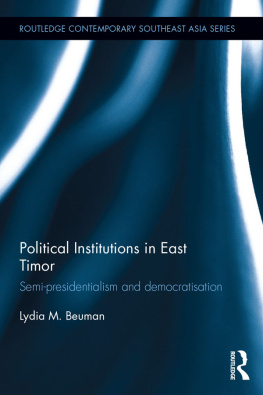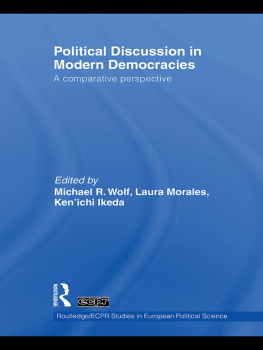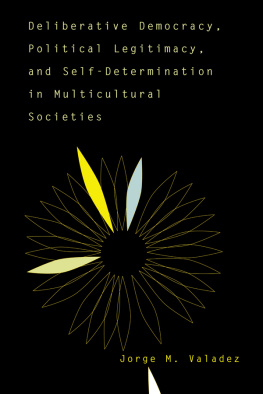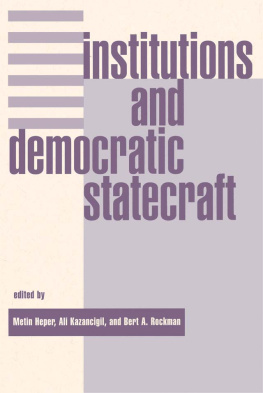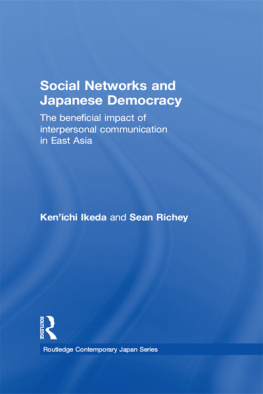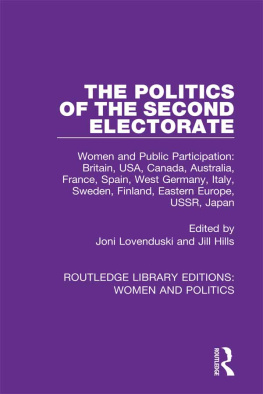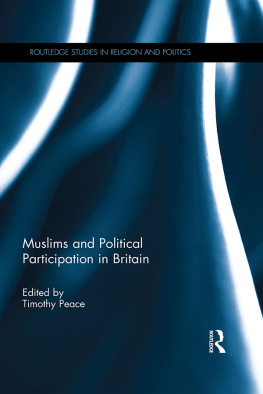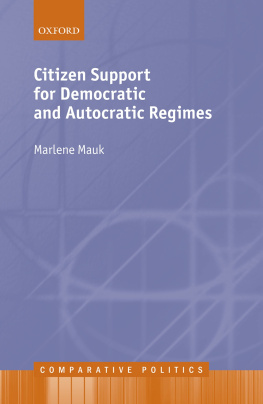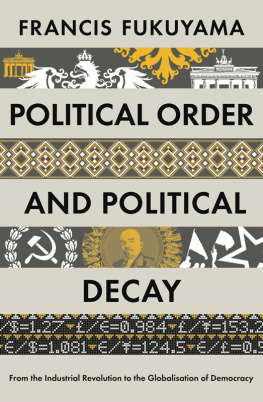POLITICS EAST AND WEST
Politics East and West
A Comparison of Japanese and British Political Culture
Curtis H. Martin Bruce Stronach
An East Gate Book
First published 1992 by M.E. Sharpe
Reissued 2018 by Routledge
2 Park Square, Milton Park, Abingdon, Oxon OX14 4RN
711 Third Avenue, New York, NY 10017, USA
Routledge is an imprint of the Taylor & Francis Group, an informa business
Copyright 1992 by Taylor & Francis.
No part of this book may be reprinted or reproduced or utilised in any form or by any electronic, mechanical, or other means, now known or hereafter invented, including photocopying and recording, or in any information storage or retrieval system, without permission in writing from the publishers.
Notices
No responsibility is assumed by the publisher for any injury and/or damage to persons or property as a matter of products liability, negligence or otherwise, or from any use of operation of any methods, products, instructions or ideas contained in the material herein.
Practitioners and researchers must always rely on their own experience and knowledge in evaluating and using any information, methods, compounds, or experiments described herein. In using such information or methods they should be mindful of their own safety and the safety of others, including parties for whom they have a professional responsibility.
Product or corporate names may be trademarks or registered trademarks, and are used only for identification and explanation without intent to infringe.
Publishers Note
The publisher has gone to great lengths to ensure the quality of this reprint but points out that some imperfections in the original copies may be apparent.
Disclaimer
The publisher has made every effort to trace copyright holders and welcomes correspondence from those they have been unable to contact.
A Library of Congress record exists under LC control number: 92026273
ISBN 13: 978-1-138-89644-4 (hbk)
ISBN 13: 978-1-315-17915-5 (ebk)
Britain and Japan have both been considered as paradigmsBritain, the successful democratic polity; Japan, the successful postindustrial economy. While Britain by many accounts has been suffering long-term economic decline, at least in a comparative sense, Japan has enjoyed and continues to enjoy relatively strong growth and, more recently, an expansion of influence. Yet Britain's management of economic and imperial decline can be viewed as evidence of its political "success," the maintenance, by and large, of a stable and legitimate political order. In contrast, there is much that can be viewed as "unsuccessful" about Japan's apparent inability, amidst prosperity and a remarkable degree of national homogeneity, to forge strong links of legitimacy between national political institutions and the citizenry. The present work is not a study of economic policies or growth, but it is very much concerned with the political dimension of the comparison. How true is it that the British polity, in which many generations have become habituated to democratic institutions and rules, can count on a greater degree of legitimacy and support than the Japanese, where democracy is such a recent arrival?
Culture is about the transmission of central social values, and it is accordingly a conservative force (Eckstein 1988: 792-93). Values may not always be successfully transmitted from one generation to the next, and they may undergo alteration as successive generations reinterpret values, but inertia remains a powerful force for continuity in the political culture (Girvin 1989: 31; Inglehart 1990: 19). We can read Lafcadio Hearn on Japan or Walter Bagehot on Britain and recognize some contemporary political values, if in different manifestations and proportions than in the last century. In both countries, values and attitudes have changed. Traditional deference has waned, as have the materialist aspirations of the prewar generations. In their place, "postmaterialist" values such as environmentalism appear to have sprung forth. For both Britain and Japan, the prewar and war generations have retired from or are approaching retirement from politics. The material and psychological effects of victory or defeat in World War II are no longer sufficient directly to explain the attitudes of a majority of Britons or Japanese. Because some of the changes that have taken place are recent, scholars hotly debate their magnitude, causes, and permanence. It is simply unclear at this point whether some of the older attitudes are waning for good, or being subjected to "life-cycle" effects. We ought, perhaps, to accept that both effects are likely. We should expect change. Political cultures do change. But, notwithstanding the precipitous erosion of socialist political cultures in Eastern Europe in the late 1980s, or perhaps because of them, we should be suspicious of the appearance of sudden change, or claims of sudden change in longstanding attributes of societies.
Many scholars have written about political culture and they tend to have their own definitions, but we have decided to rely mainly upon the definition given by Verba (1965: 513-17): "The political culture of a society consists of the system of empirical beliefs, expressive symbols, and values which define the situation in which political action takes place ... [it] refers to the system of beliefs about patterns of political interaction and political institutions. It refers not to what is happening in the world of politics, but what people believe about those happenings. And these beliefs can be of several kinds: they can be empirical beliefs about what the actual state of political life is; they can be beliefs as to the goals or values that ought to be pursued in political life; and these beliefs may have an important expressive or emotional dimension. Political culture forms an important link between the events of politics and the behavior of individuals in reaction to those events.... Political culture regulates who talks to whom and who influences whom. It also regulates what is said in political contacts and the effects of these contacts. It regulates the ways in which formal institutions operate as well." Many others have added their interpretations as well. Rose (1986c: 116-17) writes that "The political culture concerns intangible but important values, beliefs, and emotions that influence support for authority and compliance with its basic political laws"; Marsh (1977: 30) that "The study of political culture is the study of the way social attitudes and values shape mass political behavior"; and Kavanagh (1985a: 46) that it is comprised of "the values, beliefs, and emotions that give meaning to political behavior." We should also be careful not to judge differences in certain components of political culture as "strengths" or "weaknesses," nor should we be too quick to judge any political system a paradigm. As Richardson and Flanagan (1984: 164) note, "different cultures provide different answers that simply represent different mixes of strengths and weaknesses." Almond and Verba's ideal type of the "civic culture" in Britain may have set up unrealistic and inflated expectations for the political system, leading perhaps inevitably to the revisionist view that the system was in a state of collapse because it no longer appeared to meet the standards of the civic culture model.


